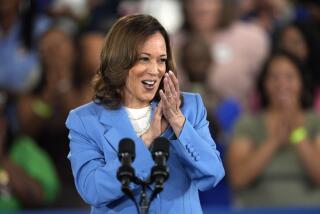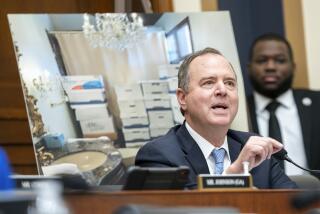Gore Campaign Gears Up to Enter More Aggressive Phase Strategists say Bush has campaigned more successfully in the last six weeks but that the vice president is pacing himself wisely.
- Share via
Ever since clinching the Democratic presidential nomination last month, Vice President Al Gore has waged a cautious campaign.
He delivered only a handful of policy announcements. He paid a few carefully scripted visits to local schools. And he went 61 days without a news conference, a silence he broke just last week.
In comparison, rival George W. Bush has been working urgently to reshape his image, dominating the political debate for the last six weeks. He unveiled $56 billion worth of spending proposals for social programs. He traveled to a dozen states to show off his compassionate side. And he did his best to cover up the scars from the bruising Republican primary.
Tactics Changing
All that is about to change, say Gore advisors. The next few weeks will see Gore roll out an ambitious mix of policy and old-fashioned bare-knuckled politics to reclaim the public’s attention.
“We’re right where we want to be,” said Doug Hattaway, a Gore spokesman.
Since the campaign for president became a two-man contest March 8, most analysts agree that Bush has done a better job than Gore of defining the political landscape and wooing the electorate.
After a primary that saw him embrace the Christian Right and lose his fall lead over the vice president, analysts said Bush had little choice but to come out charging hard.
Through the beginning of the primary season, Bush held a consistent double-digit lead over Gore in most national surveys. Now, polls show the two men in a virtual tie, though some in the last few weeks have given Bush a slight edge.
“The last six weeks have gone to Bush,” said Bruce Cain, director of UC Berkeley’s Institute of Government Studies. “He’s been able to move himself to the middle --and get himself back on the track he wanted.”
Even some Democratic strategists say Bush has succeeded in stealing the oxygen from Gore over the last six weeks, but they note that this is the first short sprint in what essentially remains a very close race. “Bush has done pretty well on the day-to-day parts,” said Bill Carrick, a Democratic consultant unaffiliated with the Gore campaign.
But Gore’s advisors say they plan to pick up the pace dramatically in the next few weeks.
The vice president has scheduled a 10-day period of policy speeches and campaign stops in eight states and Washington that his campaign predicts will draw attention to his differences with Bush.
That effort began Friday in Michigan with an environmental speech. By the end of the coming week, he will have spoken on urban issues with African American mayors meeting in Dallas, foreign policy in Boston and economic issues in Albany, N.Y.
At a news conference Friday, Gore dismissed criticism that the Bush campaign has had more direction and focus than his campaign since the March primaries.
“This is April,” he said. “It’s a good time to dig deeply for the kinds of insight that I think can help to bring about the revolutionary improvements needed in our public schools.
“I have been very pleased with the progress of the campaign across the board,” Gore said.
His aides liken the coming period to autumn of last year, after Bill Bradley, the former senator from New Jersey, caught the Gore campaign complacently looking beyond the primary election. Shaking off his organization’s lethargy, the vice president energized his campaign and launched one aggressive salvo after another toward Bradley, painting Bradley’s health care proposals as ill advised and a threat to Medicare.
“In the autumn, Bradley came out with his policy positions and we entered a compare-and-contrast phase. We’re in that same position this week,” said Chris Lehane, Gore’s campaign spokesman.
“Bush put out his positions and took a step toward the center,” he said, and now Gore will compare those policies with his own, focusing in coming weeks on education, health care, the environment, Social Security and Medicare as well as on what has become a theme of his campaign: How to make the most responsible choices during the nation’s current prosperity.
Gore’s plan is to expose what he sees as flaws in Bush’s program and to paint Bush’s plans as irresponsible and not fiscally sound.
“His numbers just do not work,” Lehane said. “His tax cuts benefit just a segment of our society.”
Bush’s top advisors credit the seeming shift in momentum to a strategy in which they have tried to seize traditional Democratic issues such as education and health care with a barrage of new proposals over the last few weeks.
That tactic has a second benefit as well, Bush advisors believe. By focusing on Bush’s commitment to issues appealing to the political center, they contend that Bush has been successful in quelling any lingering suspicions that he is a right-wing ideologue, a perception born during his primary battle with Sen. John McCain of Arizona.
Democratic strategists contend that one reason Bush has been somewhat successful in addressing that perception is because he has adopted positions like those already held by Gore.
“To me, Bush is saying, ‘I agree with the Democrats that the federal government ought to have an activist role.’ He’s becoming Democrat-light,” said Carrick, the Democratic strategist.
The criticisms echo complaints Republicans made throughout the 1990s about Bill Clinton and his “New Democrat” agenda.
And, like Clinton, Bush and his aides believe he is not so much copying the opposition as synthesizing a new blend of ideas and themes traditionally associated with both parties; marrying, for instance, the typical Democratic priority on an aggressive federal role in education with a more conservative emphasis on standards, discipline and local control.
This repositioning has shown dividends, with Bush running well in early surveys among key swing voter groups that Clinton attracted in 1996, such as independents and married women, especially those with kids.
Even so, given the unusual length of the general election campaign, some observers believe that Gore has been smart to husband his resources in the months leading up to the conventions, when each candidate receives $67.6 million in federal cash to finance their fall campaigns.
Most analysts agree Gore has work to do. Gore received a lot of air time over the last few weeks by announcing that he believed Elian Gonzalez should remain in the United States, but many took the statement as pandering to Cuban American voters in Florida.
Cards on the Table
That move, some analysts said, only served to reemphasize his image as a politician who--as Bush constantly says--will say anything to get elected.
“Gore hurt himself,” said Stuart Rothenberg, an independent political analyst.
By taking a newly aggressive tack in the weeks ahead, Gore advisors hope their candidate will be able to put such impressions behind them.
Bush’s new policies, they believe, will benefit Gore because the campaign will be able to address Bush’s issues head-on and point out his weaknesses.
“The beauty is, he’s laid issues on the table,” Gore spokesman Hattaway said. “Now we can have some good debate.”
Times political reporter Ronald Brownstein contributed to this story.
More to Read
Get the L.A. Times Politics newsletter
Deeply reported insights into legislation, politics and policy from Sacramento, Washington and beyond. In your inbox twice per week.
You may occasionally receive promotional content from the Los Angeles Times.










